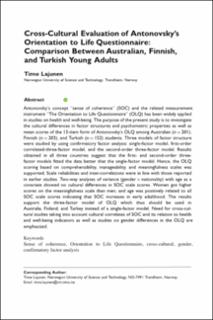| dc.contributor.author | Lajunen, Timo Juhani | |
| dc.date.accessioned | 2021-03-23T11:08:48Z | |
| dc.date.available | 2021-03-23T11:08:48Z | |
| dc.date.created | 2021-02-23T00:21:54Z | |
| dc.date.issued | 2019 | |
| dc.identifier.citation | Psychological Reports. 2019, 122 (2), 731-747. | en_US |
| dc.identifier.issn | 0033-2941 | |
| dc.identifier.uri | https://hdl.handle.net/11250/2735051 | |
| dc.description.abstract | Antonovsky’s concept “sense of coherence” (SOC) and the related measurement instrument “The Orientation to Life Questionnaire” (OLQ) has been widely applied in studies on health and well-being. The purpose of the present study is to investigate the cultural differences in factor structures and psychometric properties as well as mean scores of the 13-item form of Antonovsky’s OLQ among Australian (n = 201), Finnish (n = 203), and Turkish (n = 152) students. Three models of factor structure were studied by using confirmatory factor analysis: single-factor model, first-order correlated-three-factor model, and the second-order three-factor model. Results obtained in all three countries suggest that the first- and second-order three-factor models fitted the data better that the single-factor model. Hence, the OLQ scoring based on comprehensibility, manageability, and meaningfulness scales was supported. Scale reliabilities and inter-correlations were in line with those reported in earlier studies. Two-way analyses of variance (gender × nationality) with age as a covariate showed no cultural differences in SOC scale scores. Women got higher scores on the meaningfulness scale than men, and age was positively related to all SOC scale scores indicating that SOC increases in early adulthood. The results support the three-factor model of OLQ which thus should be used in Australia, Finland, and Turkey instead of a single-factor model. Need for cross-cultural studies taking into account cultural correlates of SOC and its relation to health and well-being indicators as well as studies on gender differences in the OLQ are emphasized. | en_US |
| dc.language.iso | eng | en_US |
| dc.publisher | SAGE | en_US |
| dc.rights | Attribution-NonCommercial-NoDerivatives 4.0 Internasjonal | * |
| dc.rights.uri | http://creativecommons.org/licenses/by-nc-nd/4.0/deed.no | * |
| dc.title | Cross-Cultural Evaluation of Antonovsky’s Orientation to Life Questionnaire: Comparison Between Australian, Finnish, and Turkish Young Adults | en_US |
| dc.type | Peer reviewed | en_US |
| dc.type | Journal article | en_US |
| dc.description.version | acceptedVersion | en_US |
| dc.source.pagenumber | 731-747 | en_US |
| dc.source.volume | 122 | en_US |
| dc.source.journal | Psychological Reports | en_US |
| dc.source.issue | 2 | en_US |
| dc.identifier.doi | 10.1177/0033294118765420 | |
| dc.identifier.cristin | 1892584 | |
| dc.description.localcode | © 2020. This is the authors' accepted and refereed manuscript to the article. This manuscript version is made available under the CC-BY-NC-ND 4.0 license http://creativecommons.org/licenses/by-nc-nd/4.0/ The final authenticated version is available online at: https://doi.org/10.1177%2F0033294118765420 | en_US |
| cristin.ispublished | true | |
| cristin.fulltext | postprint | |
| cristin.qualitycode | 1 | |

